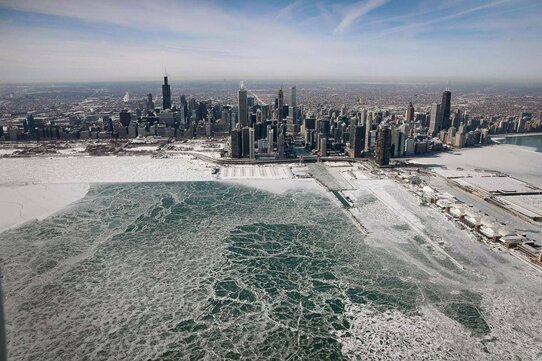Life Threatening Temperatures Strike the Midwest
Brooke McBee
Brooke McBee
For many Georgians, the thought of a winter storm is an exciting one, as it brings school and work cancellations, a rare chance to pull out the sleds, and weather perfectly suited for delicious hot chocolate. However, for Midwesterners, it is another year of shoveling driveways to dangerously navigate their way across icy roads in temperatures cold enough to induce frostbite in a matter of minutes. The Midwest is colder than one may think, and Georgians have a lot to say about this winter weather.
Many states in the Midwest are experiencing life-threatening cold the week of January 27, as the polar vortex causes temperatures to plummet well into the negatives with wind chills as low as 60 below zero. “It is crazy,” Alicia Keup, a sophomore in Wisconsin, reveals, “I heard on the news or something that three people died, I think.” With that number now up to seven, trains and schools are cancelled, mail services are suspended, and state of emergencies are declared when the Midwest becomes colder than places like Siberia, Alaska, and even Antarctica. “Mar’s Weather” even made a report claiming much of the upper Midwest’s highs did not reach that of Mar’s latest reported high- technically, not proving the Midwest is colder than Earth’s neighboring planet, but it is still a good indication of dangerous, record-setting temperatures.
With weather the coldest it has been in a generation, making preparations can be difficult. Keup braces for the cold by “getting the plow hooked up and being ready to shovel it all,” while Maggie Kempen, another Wisconsin student, expresses, “staying inside, shoveling, letting my dog out for short amounts of time, and driving slower,” are important actions to take. Other students, such as Ashley McBurnett, would prepare by expecting, “to be home and stocking up food.”
Though, no matter how much one prepares, danger is always looming “because kids have to walk to school in this cold weather, cars can crash and people can die or get hurt.”, Keup explains. This is part of the reason she believes schools should take more precaution since, “my [Keup’s] district guy says he never cancels for cold weather… when all other districts are cancelled, we usually still have school.” Though districts in Wisconsin may be hesitant to cancel school, places in Georgia take into consideration even the smallest threat of possible snow as classes for many were canceled on January 29th. The “snow day” may not have resulted in much snow for most of Georgia, as the sun was shining for the majority of the day, but students thought the cancellation was a good decision. One aforementioned Hillgrove sophomore, Ashley McBurnett, believes that, “if it looks like it is going to be dangerous they should cancel school.” Atallia Stewart agrees as she declares that school districts should take “the same amount of precaution they have been taking.”
Despite finding the school’s cancellation reasonable, many Georgian students still believe they overreact when it comes to snow and other winter weather. McBurnett advises that, “we should not freak out because half the time it is not even bad, like, calm down.” Stewart expresses this same belief as she communicates, “We get, like, two inches and they have to cancel school, but in the North, they have the truck ‘stuff’ [plows] to get rid of the snow.”
Though the Midwest is more prepared for winter storms, the current one is certainly pushing them to their limits. More low-temperature records may be broken as they continue to be below zero well throughout the week, continuing to impact school and postal operations. However, this is not the first polar vortex they have had to handle so one can expect strong resilience from the Midwest as more snow falls to much of their land.
Many states in the Midwest are experiencing life-threatening cold the week of January 27, as the polar vortex causes temperatures to plummet well into the negatives with wind chills as low as 60 below zero. “It is crazy,” Alicia Keup, a sophomore in Wisconsin, reveals, “I heard on the news or something that three people died, I think.” With that number now up to seven, trains and schools are cancelled, mail services are suspended, and state of emergencies are declared when the Midwest becomes colder than places like Siberia, Alaska, and even Antarctica. “Mar’s Weather” even made a report claiming much of the upper Midwest’s highs did not reach that of Mar’s latest reported high- technically, not proving the Midwest is colder than Earth’s neighboring planet, but it is still a good indication of dangerous, record-setting temperatures.
With weather the coldest it has been in a generation, making preparations can be difficult. Keup braces for the cold by “getting the plow hooked up and being ready to shovel it all,” while Maggie Kempen, another Wisconsin student, expresses, “staying inside, shoveling, letting my dog out for short amounts of time, and driving slower,” are important actions to take. Other students, such as Ashley McBurnett, would prepare by expecting, “to be home and stocking up food.”
Though, no matter how much one prepares, danger is always looming “because kids have to walk to school in this cold weather, cars can crash and people can die or get hurt.”, Keup explains. This is part of the reason she believes schools should take more precaution since, “my [Keup’s] district guy says he never cancels for cold weather… when all other districts are cancelled, we usually still have school.” Though districts in Wisconsin may be hesitant to cancel school, places in Georgia take into consideration even the smallest threat of possible snow as classes for many were canceled on January 29th. The “snow day” may not have resulted in much snow for most of Georgia, as the sun was shining for the majority of the day, but students thought the cancellation was a good decision. One aforementioned Hillgrove sophomore, Ashley McBurnett, believes that, “if it looks like it is going to be dangerous they should cancel school.” Atallia Stewart agrees as she declares that school districts should take “the same amount of precaution they have been taking.”
Despite finding the school’s cancellation reasonable, many Georgian students still believe they overreact when it comes to snow and other winter weather. McBurnett advises that, “we should not freak out because half the time it is not even bad, like, calm down.” Stewart expresses this same belief as she communicates, “We get, like, two inches and they have to cancel school, but in the North, they have the truck ‘stuff’ [plows] to get rid of the snow.”
Though the Midwest is more prepared for winter storms, the current one is certainly pushing them to their limits. More low-temperature records may be broken as they continue to be below zero well throughout the week, continuing to impact school and postal operations. However, this is not the first polar vortex they have had to handle so one can expect strong resilience from the Midwest as more snow falls to much of their land.


